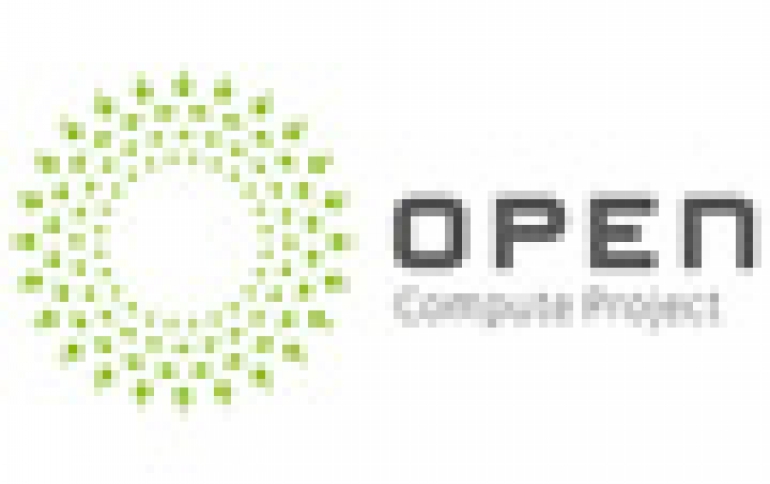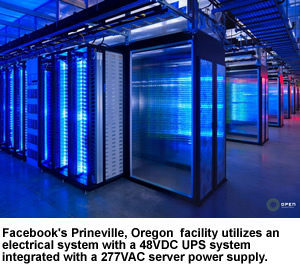
Facebook Goes Into Hardware By Promoting Data Center Efficiency
Facebook wants to get in on computer hardware as it
teamed up with HP, Dell, Intel and AMD to launch the "open compute project."
The Open Compute Project showcases Facebook?s latest advancements to drive data center efficiency and make their specifications open to the industry.
 The initiative will share the custom-engineered technology applied in Facebook's first dedicated data center in Prineville, Oregon. Facebook claims that this technology delivered a 38 percent increase in energy efficiency at 24 percent lower cost for Facebook, and the specifications and best practices behind those gains will now be available to companies across the industry.
The initiative will share the custom-engineered technology applied in Facebook's first dedicated data center in Prineville, Oregon. Facebook claims that this technology delivered a 38 percent increase in energy efficiency at 24 percent lower cost for Facebook, and the specifications and best practices behind those gains will now be available to companies across the industry.
"Facebook and our development partners have invested tens of millions of dollars over the past two years to build upon industry specifications to create the most efficient computing infrastructure possible," said Jonathan Heiliger, vice president of technical operations at Facebook. "These advancements are good for Facebook, but we think they could benefit all companies. Today we're launching the Open Compute Project, a user-led forum, to share our designs and collaborate with anyone interested in highly efficient server and data center designs. We think it's time to demystify the biggest capital expense of an online business -- the infrastructure."
 Inspired by the success of open source software, Facebook is publishing technical specifications and mechanical CAD files for the Prineville data center's servers, power supplies, server racks, battery backup systems and building design. This technology enabled the data center to achieve an initial power usage effectiveness (PUE) ratio of 1.07, compared with 1.5 for our existing facilities, which fall into the "best practice" category as defined by the U.S. Environmental Protection Agency. Established by the Green Grid in 2007, PUE is an indicator of data center energy efficiency, and the lower the number, the better.
Inspired by the success of open source software, Facebook is publishing technical specifications and mechanical CAD files for the Prineville data center's servers, power supplies, server racks, battery backup systems and building design. This technology enabled the data center to achieve an initial power usage effectiveness (PUE) ratio of 1.07, compared with 1.5 for our existing facilities, which fall into the "best practice" category as defined by the U.S. Environmental Protection Agency. Established by the Green Grid in 2007, PUE is an indicator of data center energy efficiency, and the lower the number, the better.
Facebook is releasing these designs as open hardware, aiming to encourage industry-wide collaboration around best practices for data center and server technology.
Advanced Micro Devices, Dell, HP and Intel are among the companies that co-developed technology with Facebook. In addition, Dell's Data Center Solutions business will design and build servers based on the Open Compute Project specification. Synnex Corporation will also serve as a vendor for Open Compute Project servers, offering fully integrated and tested solutions based on customers' specifications.
 In addition to the energy savings, Open Compute Project hardware means data center infrastructure costs 24 percent less to build out than Facebook's existing data centers.
In addition to the energy savings, Open Compute Project hardware means data center infrastructure costs 24 percent less to build out than Facebook's existing data centers.
Servers use a vanity-free design with no paint, logos, stickers, or front panel ? and are free of all non-essential parts. This saves more than 6 pounds of materials per server. In a typical data center, this would save more than 120 tons of material from being manufactured, transported, and, ultimately, discarded.
Facebook is publishing specifications and mechanical designs for Open Compute Project hardware, including motherboards, power supply, server chassis, and server and battery cabinets. In addition, Facebook is making available its data center electrical and mechanical construction specifications.
More information about the project, specifications and CAD files are available at http://opencompute.org/ Facebook Engineering page at http://www.facebook.com/Engineering
 The initiative will share the custom-engineered technology applied in Facebook's first dedicated data center in Prineville, Oregon. Facebook claims that this technology delivered a 38 percent increase in energy efficiency at 24 percent lower cost for Facebook, and the specifications and best practices behind those gains will now be available to companies across the industry.
The initiative will share the custom-engineered technology applied in Facebook's first dedicated data center in Prineville, Oregon. Facebook claims that this technology delivered a 38 percent increase in energy efficiency at 24 percent lower cost for Facebook, and the specifications and best practices behind those gains will now be available to companies across the industry.
"Facebook and our development partners have invested tens of millions of dollars over the past two years to build upon industry specifications to create the most efficient computing infrastructure possible," said Jonathan Heiliger, vice president of technical operations at Facebook. "These advancements are good for Facebook, but we think they could benefit all companies. Today we're launching the Open Compute Project, a user-led forum, to share our designs and collaborate with anyone interested in highly efficient server and data center designs. We think it's time to demystify the biggest capital expense of an online business -- the infrastructure."
 Inspired by the success of open source software, Facebook is publishing technical specifications and mechanical CAD files for the Prineville data center's servers, power supplies, server racks, battery backup systems and building design. This technology enabled the data center to achieve an initial power usage effectiveness (PUE) ratio of 1.07, compared with 1.5 for our existing facilities, which fall into the "best practice" category as defined by the U.S. Environmental Protection Agency. Established by the Green Grid in 2007, PUE is an indicator of data center energy efficiency, and the lower the number, the better.
Inspired by the success of open source software, Facebook is publishing technical specifications and mechanical CAD files for the Prineville data center's servers, power supplies, server racks, battery backup systems and building design. This technology enabled the data center to achieve an initial power usage effectiveness (PUE) ratio of 1.07, compared with 1.5 for our existing facilities, which fall into the "best practice" category as defined by the U.S. Environmental Protection Agency. Established by the Green Grid in 2007, PUE is an indicator of data center energy efficiency, and the lower the number, the better.
Facebook is releasing these designs as open hardware, aiming to encourage industry-wide collaboration around best practices for data center and server technology.
Advanced Micro Devices, Dell, HP and Intel are among the companies that co-developed technology with Facebook. In addition, Dell's Data Center Solutions business will design and build servers based on the Open Compute Project specification. Synnex Corporation will also serve as a vendor for Open Compute Project servers, offering fully integrated and tested solutions based on customers' specifications.
 In addition to the energy savings, Open Compute Project hardware means data center infrastructure costs 24 percent less to build out than Facebook's existing data centers.
In addition to the energy savings, Open Compute Project hardware means data center infrastructure costs 24 percent less to build out than Facebook's existing data centers.
Servers use a vanity-free design with no paint, logos, stickers, or front panel ? and are free of all non-essential parts. This saves more than 6 pounds of materials per server. In a typical data center, this would save more than 120 tons of material from being manufactured, transported, and, ultimately, discarded.
Facebook is publishing specifications and mechanical designs for Open Compute Project hardware, including motherboards, power supply, server chassis, and server and battery cabinets. In addition, Facebook is making available its data center electrical and mechanical construction specifications.
More information about the project, specifications and CAD files are available at http://opencompute.org/ Facebook Engineering page at http://www.facebook.com/Engineering





















